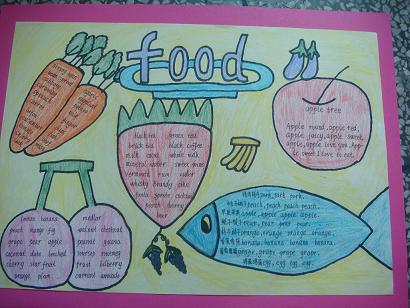【www.bbjkw.net--经验交流材料】
小学英语手抄报篇1:英语手抄报题目

英语手抄报题目是怎样的呢?英语手抄报题目独特的地方呢?英语对于人们的交往是非常的重要的。下面是小编分享的英语手抄报题目,希望能够帮到大家。
英语手抄报题目
中国传统节日Chinese Festivals
父亲节Father’s Day
爱心Helping hands
永不放弃Never give up
地球一小时 Earth Hour
发现Discovery
身边的电Electricity all around
美国的乡村音乐American country music
海里有什么动物What Animals are the sea?
假如我又回到了童年If I were a Boy Again
happy to learn English 快乐英语
action English 动感英语
Better English,Better Life 学好英语 改变人生
What Animals are the sea?海里有什么动物
The Carnival Of The Animals 动物狂欢节
English sky英语天空
English Corner 英语角
Real & Relax English 时时英语
English Learning Time E学换乘站
Comic Zone 可乐英语
English Salon 英语沙龙
English World 英语世界
English Space 英语天地
English Fastfood 英语麦当劳/英语快餐
English Square 英语广场
English Digest 英语文摘
Living English 实战英语
English Club英语俱乐部
英语故事:保持饥饿,保持愚蠢 Stay Hungry, Stay Foolish
The former CEO of Apple company is Steve Jobs, though he died many years ago, his lengend is still going on. His classic speech which was delivered at Stanford University inspired the young generation to move on. He pointed out that the young people should always stay hungry, stay foolish, which meant that people should never get satisfied and be curious about things, so that they would have the motivation to keep searching. Steve never graduated from a college, he quit school and then focused his attention on the computer. He made it and started his own company. Later he got fired and he turned to create the animation studio, which later saved the Apple company. Stay hungry, stay foolish helped Steve to be successful.
苹果公司的前首席执行官史蒂夫乔布斯,尽管他很多年前就去世了,但是他的传说仍在继续。他在斯坦福大学的经典演讲,鼓舞了年轻一代继续前进。他指出,年轻人应该总是保持饥饿,保持愚蠢,这意味着人们永远不要满足,对事物保持好奇,这样他们就会有动机继续探索。史蒂夫从来没有从大学毕业,他退学了,然后他将注意力集中在电脑上。他开创了自己的公司。后来他被解雇了,他转向去创建动画工作室,后来拯救了苹果公司。保持饥饿,保持愚蠢帮助史蒂夫获得成功。
小学英语手抄报篇2:小学英语手抄报图片大全

随着我国对外开放的不断扩大化,科学技术的不断进步,国际地位的不断提高,迫切需要造就一大批精通外语的专门人才,以加速我国“四化”进程,使我国在国际事务中发挥更大更积极的作用。因此,学好英语对实现上述目标具有重要大的现实意义和深远的历史意义。
小学英语基础知识汇总
一般现在时基本用法介绍 一般现在时的功能:
1.表示事物或人物的特征、状态。如:The sky is blue.天空是蓝色的。
2.表示经常性或习惯性的动作。如:I get up at six every day.我每天六点起床。
3.表示客观现实。如:The earth goes around the sun.地球绕着太阳转。
一般现在时的构成:1. be动词:主语+be(am, is, are)+其它。如:I am a boy.我是一个男孩。
注意:(我用am,你用are,三单is,复数are。)
行为动词:
主语+行为动词(+其它)
如:We study English.我们学习英语。
注意:(当主语为第三人称单数(he, she,it)时,要在动词后加"-s"或"-es"。如:Mary likes Chinese.玛丽喜欢汉语。)
一般现在时的变化:
1. be动词的变化。
肯定句:主语+be+其它
He is a worker. 他是工人。
否定句:主语+ be + not +其它。
He is not a worker.他不是工人。
一般疑问句:Be +主语+其它。
(be动词移到句首)
如:I am a student.
-Are you a student?
-Yes. I am. / No, I"m not.
特殊疑问句:疑问词+一般疑问句。
如:My bike is under the tree.
Is your bike under the tree?
Where is your bike?
2.行为动词的变化。
肯定句:主语+动词原形(+其它)。
否定句:主语+ don"t( doesn"t ) +动词原形(+其它)。
如:I like bread. I don"t like bread.
当主语为第三人称单数时,要用doesn"t构成否定句。
如:He ofter plays football.
He doesn"t often play football.
一般疑问句:Do( Does ) +主语+动词原形+其它。(句首加助动词do, does)
如:I often play football.
- Do you often play football?
- Yes, I do. / No, I don"t.
当主语为第三人称单数时,要用does构成一般疑问句。
如:She goes to school by bike.
- Does she go to school by bike?
- Yes, she does. / No, she doesn"t.
特殊疑问句:疑问词+一般疑问句。
如:She goes to school by bike.
Does she go to school by bike?
How does she go to school?
动词+s的变化规则
1.一般情况下,直接加-s,如:cook-cooks, milk-milks
2.以s. x. sh. ch. o结尾,加-es,如:guess-guesses, wash-washes, watch-watches, go-goes
3.以“辅音字母+y”结尾,变y为i, 再加-es,如:study-studies
现在进行时
1.现在进行时表示现在正在进行或发生的动作,也可表示当前一段时间内的活动或现阶段正在进行的动作。(句中一般含有now, look, listen.)
2.现在进行时的肯定句基本结构为be+动词ing.
如:Tom is reading books in his study .
3.现在进行时的否定句在be后加not。
如:Tom is reading books in his study .
Tom is not reading books in his study .
4.现在进行时的一般疑问句把be动词调到句首。
如:Tom is reading books in his study .
Is Tom reading books in his study ?
5.现在进行时的特殊疑问的基本结构为:疑问词+一般疑问句?
(注意:当划线部分包含谓语动词时,用疑问词代替划线部分放到句首,原划线处应加上doing)
如:Tom is reading books in his study .
Tom is reading books in his study .
Is Tom reading books in his study ?
Is Tom reading books in his study ?
What is Tom doing in his study?
Where is Tom reading books?
动词加ing的变化规则
1.一般情况下,直接加ing,如:cook-cooking
2.以不发音的e结尾,去e加ing,如:make-making, taste-tasting
3.如果末尾是辅音字母加一个元音字母和一个辅音字母,双写末尾的辅音字母,再加ing,如:run-running, stop-stopping
小学英语手抄报篇3:童话世界英语手抄报
孩子们多听童话故事也有助于提高孩子的注意力。使孩子集中注意力不是一件容易的事,而集中注意力对孩子成长的重要性是不言而喻的。下文就是一些童话世界英语的手抄报资料内容,欢迎大家阅读与了解。
小学三年级英文童话故事:斑鸿说袅
One day, an owl1 flew persistently2 towards the east till it was completely exhausted3, so it stopped in a forest to take a rest. It happened that a turtledove was also resting there. Hearing the panting of the owl, it asked: "Where are you going in such a hurry?"
The owl said: "I am moving to the east."
The turtledove asked closely: "Why?"
The owl said: "The people in the west all say my cry is unpleasant and dislike me I cannot stay there any longer. I must move to a new place."
The turtledove said: "Can you solve your problem by changing a place? In my opinion, no matter where you move to, it won"t help."
The owl felt rather angry at the words of the turtledove, but it still asked in surprise: "Can you forecast the future?"
The turtledove said: "This is very simple. If you don"t change your cry, the people in the east will dislike you all the same."
一天,猫头鹰一个劲儿地向东方飞去,飞得精疲力尽,停在树林里休息。一只斑鸿恰巧也在那里休息,听见猫头鹰呼味呼味地喘气,就对猫头鹰说:“你这样急急忙忙地赶路,去哪儿呀?”
猫头鹰说:“我想到东方去住。”
斑鸡追问:“为什么?”
猫头鹰说:“西边的人,都说我叫的声音很难听,都讨厌我。在那儿我住不下去了,非换个地方不可!”
斑鸿说:“难道换个地方就可以解决问题吗?我看,不管你搬到哪里去,都没有用!”
猫头鹰觉得斑坞的话太气人,便惊奇地问:“你能未卜先知?”
斑鸡说:“这很简单,如果你不改变你的叫声,那么东边的人也一样会讨厌你的!”
四年级英文童话故事:披着狮皮的驴
An ass1 once found a lion"s skin. He put it on, and walked towards the village.
All fled when he came near, both men and animals.
The ass felt quite proud. He lifted his voice and brayed2, but then everyone knew him.
His owner came up and gave him a sound whipping(鞭打).
Shortly afterwards, a fox came up to him and said, "Ah, I knew it was you by your voice."
小学五年级英文童话故事:公羊触篱
There was a sturdy ram1 with a pair of thick horns upright on its head.
It strutted2 about proudly and saw a fence built with bamboo and wood in front, which blocked its way. It cast a sidelong glance at the fence, lowered its neck and lunged at the fence, hoping to knock it down. The fence remained intact but the ram injured its own horns.
If it had not injured its horns, the ram would have persisted obstinately3 in butting4 against the fence, even against the spokes5 of a wheel until it bled with a fractured skull6.
As a result, with its horns caught in the fence, the ram could neither advance nor retreat but bleat7 helplessly.
一头长得非常雄壮的公羊的头上,挺立着一对粗大的犄角。
公羊骄傲地踱着步,看见前面有一道竹木编成的篱笆挡住了它的去路。公羊斜着眼睛看看,便弯下脖子呼的一声撞上去,想把篱笆撞倒。结果篱笆纹丝不动,它反把自己的犄角碰伤了。
假如公羊没有碰伤犄角的话,那么它还会一个劲儿地撞下去,甚至向车轮的辐条上撞去,直到头破血流为止。
结果呢?公羊的犄角被篱笆夹住,进也不得,退也不得,只能“咩咩”不停地叫唤。
本文来源:https://www.bbjkw.net/fanwen15973/
推荐访问:小学英语手抄报图片